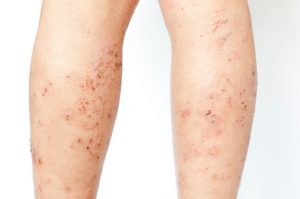 Atopic dermatitis (eczema) treatment focuses on prevention of flares and disease management. The American Academy of Dermatology’s (Academy) has updated the guidelines regarding the management of adult eczema with a strong focus on management and better control of the condition along with the coexistence of allergies and the use of alternative therapies to work alongside medical treatments. The evidence-based recommendations compiled a four-part series of care and management of eczema.
Atopic dermatitis (eczema) treatment focuses on prevention of flares and disease management. The American Academy of Dermatology’s (Academy) has updated the guidelines regarding the management of adult eczema with a strong focus on management and better control of the condition along with the coexistence of allergies and the use of alternative therapies to work alongside medical treatments. The evidence-based recommendations compiled a four-part series of care and management of eczema.
Estimates suggest nearly 20 percent of children and two to three percent of adults have atopic dermatitis. Commonly referred to as eczema, it is a condition that causes itchiness and increases the risk of skin infections. Eczema can negatively impact a person’s quality of life.
Advertisement
Brett M. Coldiron, dermatologist and president of the Academy, said, “Whether you are a parent of a baby with atopic dermatitis or an adult with the condition, your dermatologist can help you develop a treatment plan that provides effective relief for this dry and itchy skin condition, maintain that relief, and prevent flare-ups or complications. This new guideline discusses proactive treatment that can help patients reduce disease severity and maintain treatment success for overall improved quality of life.”
A proactive approach has been recommended in order to prevent flares and ensure a successful disease management. In the past, approaches to eczema were simply reactive as opposed to being proactive.
Proactive initiatives include intermittent but scheduled use of corticosteroid topical creams or topical calcineurin inhibitors applied to areas most affected. Reactive strategies include using anti-inflammatory medications when symptoms arise. In either approach, there is a strong importance of the use of moisturizers to prevent flare-ups.
One of the study authors Lawrence F. Eichenfield added, “While both proactive and reactive approaches are still effective, patients may find greater success in controlling their flares or extending the period of time between flares, if they choose a proactive approach.”
Aside from proactive approaches to disease management, the guidelines also stress the importance of education for both patient and caregiver. This education can include individualized “eczema schools,” which are led by nurses who show videos and teach caregivers and patients alike about eczema and its proper care and management.
Link between allergens, irritants for atopic dermatitis treatment
Allergens and irritants are factors that can worsen atopic dermatitis. Although each patient may have their own unique allergens and irritants for eczema, there are some widespread ones to pay attention to. Some of those common allergens and irritants include wool and manmade fibers, soaps and cleaners, perfumes and makeup, substances like chlorine, mineral oil, and solvents, dust and sand, cigarette smoke, eggs, peanuts, milk, fish, soy, wheat, dust mites, mold, pollen, and dog or cat dander.
Intense emotional changes, such as stress or anger, can also trigger flare-ups of eczema along with insufficient moisturizing after a bath or shower, low humidity in the winter, dry climate, long or hot baths or showers, going sweat to chills, and bacterial infections.
Uncovering your own allergens and irritants can help you better prevent future flare-ups as you can properly manage your triggers or avoid them altogether.
Alternative and complementary approaches for atopic dermatitis treatment not proven: Study
 The Academy reviewed previous research on management and treatment of atopic dermatitis and found that alternative and complementary approaches to treatment are not proven to be effective.
The Academy reviewed previous research on management and treatment of atopic dermatitis and found that alternative and complementary approaches to treatment are not proven to be effective.
Another lead author Robert Sidbury said, “While there are many anecdotal tips and alternative options available to patients with atopic dermatitis, there is not enough evidence-based research to say for certain that these can provide any or better relief for patients, or be a complement to medical treatment.”
For example, it is not proven that using specific laundry techniques or covering mattresses and pillows in order to reduce dust mites can help better manage eczema. Also, there has not been any proven device or dietary supplement to help relieve the symptoms associated with atopic dermatitis.
Research on Chinese medicine as treatment for eczema have also yielded mixed results and there are raised concerns about liver toxicity surrounding the use of herbs.
Dr. Eichenfield added, “All four parts of these guidelines work together to offer guidance and provide the latest research to assist dermatologists and their patients in developing an effective treatment plan that addresses the long-term management of atopic dermatitis and improves the patient’s quality of life.”
Treatment and therapy options for atopic dermatitis
Unfortunately, proper management of atopic dermatitis doesn’t occur overnight and it may take months until you feel you have it perfectly under control. Fortunately, there are many different forms of treatments and therapies your doctor may recommend, which have been shown to offer relief of symptoms and prevent flare-ups. The important aspect is that you begin treatment early on and take part in regular moisturizing no matter what kind of medication or other regime you are on.
Treatment and therapy options for atopic dermatitis include:
- Creams that can help control the itchiness and inflammation like a corticosteroid cream or ointment
- Creams that are known as calcineurin inhibitors to help repair and heal the skin. This type of treatment is generally utilized when other treatment methods have failed, as they do come with many side effects
- Medications to fight infections if sores have opened or the skin is cracked
- Some oral anti-itch medications and antihistamines that may help if your itchiness is a result of an allergen
- Oral or injected drugs that can control inflammation
- Wrapping the affected area with wet dressings and corticosteroids
- Phototherapy (light therapy), which exposes skin to a controlled amount of sunlight
- Treating stress, as stress can be a trigger to a flare-up
- Relaxation, behavior modification, or biofeedback, which may be effective in helping you steer clear of scratching the itch
Sticking to your treatment plan is your best option, as it can help you achieve success in managing your atopic dermatitis properly. It may be easy to get frustrated if treatment doesn’t work immediately, but sticking to it will increase your odds of success.
If you do find that you have tried a treatment method for quite some time and you are not receiving the relief you seek, speak to your doctor about another option. Perhaps an alternative method will be more successful than the one you’re currently on.
Related Reading:
Eczema in adults raises fracture, bone and joint injury risk
Eczema in adults raises fracture, bone or joint injury risk. The findings come from a representative sample of patients with a history of eczema, which is a chronic inflammatory skin condition that causes itchy skin and sleep disturbances. Continue reading…
Advertisement
Melatonin may improve sleep in children with eczema: Study
Melatonin may be an effective treatment for children with eczema who often experience trouble sleeping, according to the latest findings. Eczema is a skin condition that leaves the skin itchy and red. Thirty percent of children are estimated to have eczema and more than half of them have difficulty sleeping. Continue reading…
Sources:
http://www.niams.nih.gov/Health_Info/Atopic_Dermatitis/atopic_dermatitis_ff.asp#f
http://www.mayoclinic.org/diseases-conditions/eczema/basics/treatment/con-20032073
